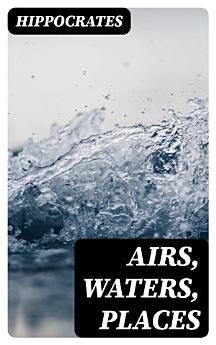Airs, Waters, Places
Hippocrates
nov. del 2022 · DigiCat
Llibre electrònic
23
Pàgines
family_home
Apte
info
reportNo es verifiquen les puntuacions ni les ressenyes Més informació
Sobre aquest llibre
In "Airs, Waters, Places," Hippocrates presents a pioneering treatise on the environmental factors influencing human health, blending observational inquiry with early medical thought. The work is characterized by its empirical approach, examining how varying climates, waters, and geographies affect the health of individuals and communities. This text stands as a seminal piece in the canon of medical literature, revealing the interconnectedness of environment and well-being, while foreshadowing later developments in epidemiology and public health. Hippocrates' style is methodical and persuasive, appealing to both rational thought and empirical observation, making it a foundational text in the medical tradition. Hippocrates, known as the 'Father of Medicine,' was a pivotal figure in shifting medical practices from mystical explanations to rational theories. Living in ancient Greece around the 5th century BCE, Hippocrates was influenced by a rich intellectual tradition and the Socratic method of inquiry. His desire to understand the human body and its ailments was propelled not only by personal curiosity but also by the practical need to treat patients in a more effective manner, reflecting the ethos of his time. This compelling work is highly recommended for readers interested in the historical roots of medicine and the continuing relevance of environmental health. "Airs, Waters, Places" offers profound insights and lays the groundwork for understanding health in the context of geography and climate—concepts that are increasingly pertinent in today's world.
Sobre l'autor
Hippocrates, often revered as the 'Father of Western Medicine,' was a seminal figure in the development of medical practice and philosophy in the classical world. Born on the Greek island of Kos around 460 BCE, he became the most celebrated physician of his time. Although direct historical records from his life are scarce, his contributions have left an indelible mark on the field of medicine. A noteworthy work attributed to Hippocrates is 'Airs, Waters, Places,' which examines environmental and lifestyle factors in relation to health and disease, proposing that one's surroundings can influence their well-being. This text is instrumental in the shift of medicine from a more superstitious practice to one predicated on observation and logical reasoning. Hippocratic thought was dominated by a belief in the natural healing process of rest, diet, exercise, and fresh air. As the reputed author of the Hippocratic Corpus, a collection of around 70 medical works of varying authenticity, his influence extends to the eponymous Hippocratic Oath, an ethical framework still in use today. Scholarly debate continues on the exact writings by Hippocrates, as many of the texts within the Corpus are considered to be the work of his followers and later interpreters who codified his teachings and practices. Despite this, Hippocrates' standing as a key historical figure in the transition to systematic and rational medical practice remains uncontested.
Puntua aquest llibre electrònic
Dona'ns la teva opinió.
Informació de lectura
Telèfons intel·ligents i tauletes
Instal·la l'aplicació Google Play Llibres per a Android i per a iPad i iPhone. Aquesta aplicació se sincronitza automàticament amb el compte i et permet llegir llibres en línia o sense connexió a qualsevol lloc.
Ordinadors portàtils i ordinadors de taula
Pots escoltar els audiollibres que has comprat a Google Play amb el navegador web de l'ordinador.
Lectors de llibres electrònics i altres dispositius
Per llegir en dispositius de tinta electrònica, com ara lectors de llibres electrònics Kobo, hauràs de baixar un fitxer i transferir-lo al dispositiu. Segueix les instruccions detallades del Centre d'ajuda per transferir els fitxers a lectors de llibres electrònics compatibles.








